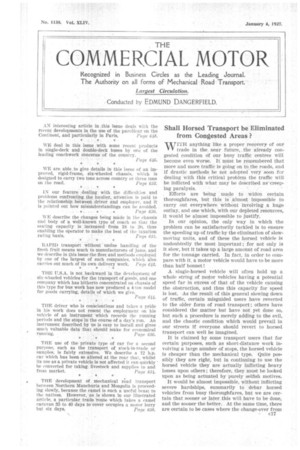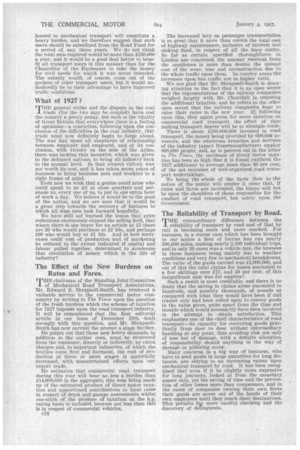Shall Horsed Transport be Eliminated from Congested Areas ?
Page 39

Page 40

If you've noticed an error in this article please click here to report it so we can fix it.
WITH anything like a proper recovery of our trade in the near future, the already congested condition of our busy traffic centres will become even worse. It must be remembered that more and more traffic is going on to the roads, and if drastic methods be not adopted very soon for dealing with this critical problem the traffic will be inflicted with what may be described as 'creeping paralysis.
Efforts are being made to widen certain thoroughfares, but this is almost impossible to carry out everywhere without involving a huge outlay, and one which, with our depleted resources, It would be almost impossible to justify.
In our opinion, the only way in which the problem can be satisfactorily tackled is to ensure the speeding up of traffic by the elimination of slow moving units, and of these the horsed vehicle is undoubtedly the most Important; for not only is it slow, but it takes up a large amount of road area for the tonnage carried. In fact, in order to compare with it, a motor vehicle would have to be more than half bonnet I A single-horsed vehicle will often hold up a whole string of motor vehicles having a potential speed far in excess of that of the vehicle causing the obstruction, and thus this capacity for speed Is lost. As the result of this general slowing down of traffic, certain misguided users have reverted to the older form of road transport ; others have considered the matter but have not yet done so, but such a procedure is merely adding to the evil, and the chaotic condition which would prevail in our streets if everyone should revert to horsed transport can well be imagined.
It is claimed by some transport users that for certain purposes, such as short-distance work in volving a large number of stops, the horsed vehicle Is cheaper than the mechanical type. Quite possibly they are right, but in continuing to use the horsed vehicle they are actually inflicting heavy losses upon others ; therefore, they must be looked upon as being actuated by purely selfish motives. It would be almost impossible, without inflicting severe hardships, summarily to debar horsed vehicles from busy thoroughfares, but we are certain that sooner or later this will have to be done, and the sooner the better. At the same time, there are certain to be cases where the change-over from horsed to mechanical transport will constitute a heavy burden, and we therefore suggest that such users should be subsidized from the Road Fund for a period of, say, three years. We do not think the total sum required would be more than £250,000 a year, and it would be a good deal better to benefit all transport users in this manner than for the Chancellor of the Exchequer to take the money for civil needs for which it was never intended. The subsidy would, of course, come out of the pockets of other transport users, but it would undoubtedly be to their advantage to have imProved traffic conditions.
What of 1927?
THE general strike and the dispute in the coal trade (for the two may be coupled) have cost the country a pretty penny, but such is the vitality of Great Britain that everywhere there is a feeling of optimism—a conviction, following upon the conclusion of the difficulties in the coal industry, that trade MUSt now definitely begin to forge ahead. The war had upset all standards of relationship between employer and employed, and at its conclusion, with victory on the side of the Allies, there was lacking that incentive, which was given to the defeated nations, to bring all industry back to the normal level. In that respect victory was not worth its cost, and it has taken seven years of leanness to bring business men and workers to a right frame of mind.
Even now we wish that a genius could arise who could speak to us all at close quarters and persuade us, every one of us, to put in ohe extra hour of work a day. We believe it would be to the good of the nation, and we are sure that it would be a great step towards the recovery of business to which all wise men look forward hopefully. We have still not learned the lesson that price reductions enormously expand the selling field, that where there -is one buyer for an article at £5 there are 20 who would purchase at £2 10s., and perhaps 100 who would buy at £1 10s. And in how many cases could cost of production and of marketing be reduced to the extent indicated if capital and labour pulled together, determined to accelerate that circulation of money which is the life of Industry?
The Effect of the New Burdens on Rates and Fares.
HE chairman of the Standing Joint Committee 1 of Mechanical Road Transport Associations, Mr. Edward S. Shrapnell-Smith, has rendered a valuable service to the commercial motor community by writing to The Times upon the question of the fresh burdens which the scheme of taxation for 1927 imposes upon the road transport industry. It will be remembered that the first editorial article in our issue of December 28th dealt strongly with this question, and Mr. ShrapnellSmith has now carried the protest a stage farther. He points out that these new heavy demands, in addition to the earlier ones, must be recovered from the consumer, directly or indirectly, by extra charges and, in important industries, of which. the textiles come first and foremost, the cost of production at three or more stages is materially Increased, with unascertained effects upon our export trade.
He estimates that commercial road transport during this year will bear no less a burden than £14,000,000 in the aggregate, this sum being made up of the estimated produce of direct motor taxation and apportioned contributions to local rates In respect of depot and garage assessments, whilst one-sixth of the produce of taxation on the h.p, rating basis is included, because not less than this Is in respect of commercial vehicles.
c18 The increased levy on passenger transportation Is so great that it more than covers the total cost of highway maintenance, inclusive of interest and sinking fund, hi respect of all the busy routes. So far as certain specified thoroughfares in London are concerned, the amount received from the omnibuses is more than double the annual cost of the wear, tear and reconstruction due to the whole traffic upon them. In country areas-the Increases upon bus traffic are in higher ratio.
We are glad that Mr. Shrapnell-Smith is drawing attention to the fact that it is an open secret that the representations of the railway companies weighed largely with Mr. Churchill in imposing the additional taxation, and he refers to the other open secret that the railway companies hope to raise their rates in the new year. If, following upon this, they again press for more taxation on commercial road transport, the effect of thus making transport clearer will be to strangle trade.
There is about £250.000,000 invested in road transport, the money. being provided by 600,000 investors, and the numerous branches and sections of the industry (apart fromomanufacture) employ 800.000 people, and, as is pointed out in the letter to The Times, the incidence of direct motor taxation has been so high that it is found (without the 1927 additions) to average more than 40 per cent. of the net revenues of well-organized road transport undertakings.
To bring the whole of the facts thus to the notice of the public will render it clear that, if rates and fares are increased, the blame will not be upon the shoulders of those responsible for theconduct of road transport, but solely upon the Government.
The Reliability of Transport by Road.
THE extraordinary difference between the reliability of transport by road and of that by rail is becoming more and more marked. For instance, in a recent case which has been brought to our notice a fleet of lorries has run nearly 500,1)00 miles, making nearly 2,500 individual trips, and in only 20 cases was a vehicle late, the lateness In these instances being mainly due to weather conditions and very few to mechanical breakdowns. The value of the goods carried was £2,000,000, and out of this the total claims for losses amounted to a few shillings over £17, and 50 per cent. of this Insignificant sum was for empties !
Such a result is most creditable, and there is no doubt that the saving in claims alone amounted to hundreds, and possibly thousands, of pounds as compared with what they would have been if rail transit only had been relied upon to convey goods to the value given, quite apart from the time and trouble which would necessarily have been involved in the attempt to obtain satisfaction. This emphasizes one of the chief characteristics of road transport—its capacity for conveying goods practically from door to door without intermediary handling at any point, thus avoiding risk not only of loss but of damage, with a definite allocation of responsibility should anything in the way of damage or pilfering occur.
Many concerns in a big way of business, who have to send goods in large quantities for long distances, are relying to an increasing extent upon mechanical transport by road. It has been recognized that even if it be slightly more expensive for long journeys, looked at from the monetary aspect only, yet the saving of time and the prevention of other losses more than compensate, and in the cases of companies owning their own fleets their goods are never out of the hands of their own employees until they reach their destinations. This permits fag more careful checking and the discovery of delinquents.












































































































